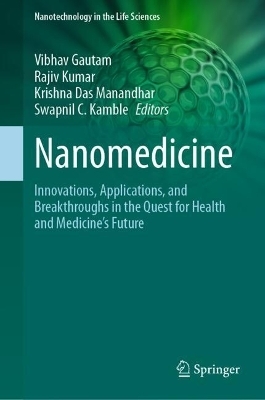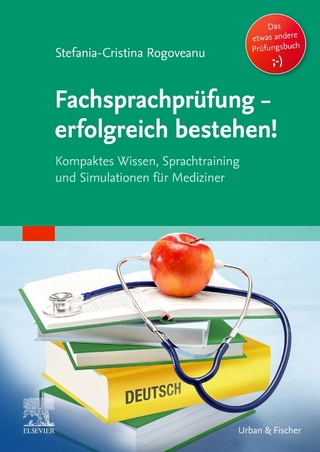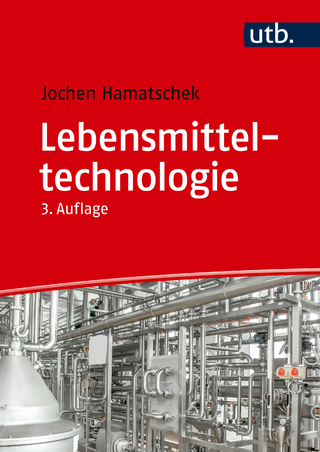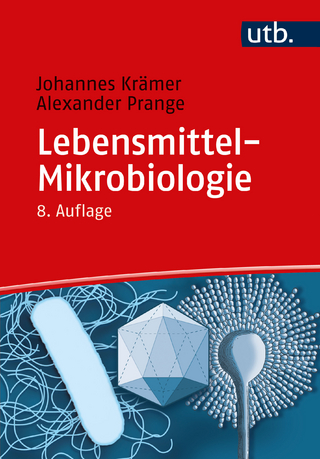
Nanomedicine
Springer International Publishing (Verlag)
978-3-031-72466-4 (ISBN)
- Noch nicht erschienen - erscheint am 16.01.2025
- Versandkostenfrei innerhalb Deutschlands
- Auch auf Rechnung
- Verfügbarkeit in der Filiale vor Ort prüfen
- Artikel merken
Nanotechnology is revolutionizing healthcare, by providing innovative solutions to some of the most challenging issues in medicine. This book provides an in-depth overview of nanoscale materials and devices that are advancing diagnostics, therapeutics, and personalized care in medical field. It focuses on nanomedicine's impact on vaccine efficacy as well as innovative diagnosis and therapy for various type of cancer while addressing concerns about safety and toxicity. It examines how nanotechnology is enhancing drug delivery by precisely targeting medicines to specific cells or tissues, thereby increasing treatment efficacy with reduced side effects. This book also explores how nanoparticles are advancing medical imaging for earlier and more accurate disease detection, and how nanosensors allow real-time biomarker monitoring for faster and more reliable diagnoses. Additionally, it explores nanomedicine's role in managing cardiovascular diseases, improving bone health through nano-extracellular vesicles, and regenerative medicine, including ongoing clinical trials and ethical considerations. This book is an essential resource for researchers, practitioners, and students, offering a comprehensive exploration of nanomedicine's role in shaping the future of health and medicine leading to a new era of precision medicine and improved patient care.
Dr. Vibhav Gautam: Dr. Vibhav Gautam is a faculty at the Centre of Experimental Medicine and Surgery at the Institute of Medical Sciences, Banaras Hindu University. Renowned for his work in ethanopharmacology and medicinal chemistry, Dr. Gautam has published extensively in top tier journals such as ACS Pharmacology and Translation Science, Medicinal Research Reviews, RSC Advances, ACS Omega, ACS Chemical Biology, ACS Applied Biomaterials, and Development. He has received the 'Academic Excellence in Publication Award' from his institute, reflecting the impact of his research. Dr. Gautam is a member of several esteemed organizations, including the American Chemical Society, Proteomics Society of India, The Association of Microbiologists of India, and the Electron Microscope Society of India. His roles as an academic editor for PLOS One and a guest associate editor for journals like Frontiers in Molecular Biosciences, Frontiers in Pharmacology, and Frontiers in Materials underscore his dedication to advancing scientific discourse and knowledge dissemination.
Dr. Rajiv Kumar: Dr. Rajiv Kumar is an expert in the area of cellular and molecular immunology of chronic infections and parasitic diseases. His research has significantly advanced the current understanding of immuno-pathogenesis of Kala-azar (visceral leishmaniasis) and severe malaria, the leading cause of morbidity and mortality among parasitic diseases. Dr. Kumar utilizes experimental models and human clinical samples to study these diseases and has identified key immune modulators to enhance the efficacy of vaccines and current therapies. One of the participants in BRICS nation young scientist conclave, Dr. Kumar is also the recipient of the Bill & Melinda Gates professional development award.
Dr. Krishna Das Manandhar: Prof. Krishna Das Manandhar is a distinguished Fulbright Senior Research Fellow and currently serves as Professor and Head of the Central Department of Biotechnology at Tribhuvan University, Nepal. He completed postdoctoral research on Dengue Virus at the La Jolla Institute for Allergy and Immunology, USA, and on Leishmaniasis at the Institute de Recherche pour le Développement (IRD), France. Prof. Manandhar earned his Ph.D. in Zoology with a specialization in Leishmaniasis from Banaras Hindu University, India. His research focuses on immunology, molecular biology, and biotechnology, with a particular emphasis on tropical infectious and viral diseases. Prof. Manandhar has received numerous accolades, including the Dirgha Sewa Padak from Tribhuvan University, the Nabil Science and Technology Award from the Nepal Academy of Science and Technology, and the Nepal Bidhya Bhusan from the Government of Nepal. He continues to lead important research projects on dengue virus infection and leishmaniasis.
Dr. Swapnil C. Kamble: Dr. Swapnil C. Kamble has been an Assistant Professor in the Department of Technology at Savitribai Phule Pune University, Pune, Maharashtra, India, since 2016. During his PhD at the National Centre for Cell Sciences, Pune, he developed a panel of biomarkers for the molecular classification of high-grade serous ovarian adenocarcinoma. As a synthetic biologist, his current research interests include discovering anti-cancer molecules from high-value medicinal plants, modifying these molecules to enhance their efficacy, developing scaffolds for in vitro models, and conducting pre-clinical evaluations of small molecules. He uses cervical, breast, and hepatic cancer cell lines, along with small animal models, to assess their efficacy. Dr. Kamble has received government grants for projects related to hepatic disease modeling and lateral flow assays for viral disease detection. He collaborates closely with government organizations, such as IM
Chapter 1 Nanomedicine Approaches in Oral Cancer: From Diagnosis to Therapy.- Chapter 2 Navigating Safety and Toxicity Challenges in Nanomedicine: Strategies, Assessment, and Mitigation.- Chapter 3 Nanomedicine's role in the COVID-19 vaccine development and optimization.- Chapter 4 Nanomedicine's Transformative Role in Advancing Cancer Treatment.- Chapter 5 Fabrication of Advanced Nanohybrid Materials and their Deployment in Electrochemical Sensing of Diverse Analytes.- Chapter 6 Nanomedicine: Bridging Nanoscience Innovations with Healthcare Solutions.- Chapter 7 Recent Advances in Nanotechnology for Diagnosis and Treatment of Cancer.- Chapter 8 Nanomedicine in Targeted Drug Delivery: Precision Therapeutics for Personalized Medicine.- Chapter 9 Nanomedicine in cardiovascular diseases: Diagnostic and therapeutic innovations for better health.- Chapter 10 Employing nano-extracellular vesicles (NEVs) as a potent therapy in ameliorating bone loss in Osteoporosis.- Chapter 11 Nanocellulose Scaffolds for Skin Tissue Engineering.- Chapter 12 Navigating Infectious Challenges: The Nanomedicine Era.- Chapter 13 Defining Nanomedicine Qualities for Optimal Therapeutic Applications.- Chapter 14 Theranostic Potential of Nanomaterials in Neurodegenerative Diseases: Insights into Biosensing, Drug Delivery & Tissue Engineering.- Chapter 15 Balancing Innovation and Responsibility: Ethical, Legal and Social Considerations in Nanomedicine.- Chapter 16 Exploring Nanomedicine Ventures and Latest Developments in Clinical Trials.- Chapter 17 Theranostics: Integrated Diagnostics and Therapy Using Nanomedicine.- Chapter 18 Navigating the nanoscale frontier: an in-depth introduction to the world of nanomedicine.
| Erscheint lt. Verlag | 16.1.2025 |
|---|---|
| Reihe/Serie | Nanotechnology in the Life Sciences |
| Zusatzinfo | XII, 563 p. 71 illus., 69 illus. in color. |
| Verlagsort | Cham |
| Sprache | englisch |
| Maße | 155 x 235 mm |
| Themenwelt | Medizin / Pharmazie ► Medizinische Fachgebiete |
| Technik ► Maschinenbau | |
| Schlagworte | Diagnostics • Drug Delivery • Medicine • nanomedicine • nanotechnology • Regenerative medicine |
| ISBN-10 | 3-031-72466-6 / 3031724666 |
| ISBN-13 | 978-3-031-72466-4 / 9783031724664 |
| Zustand | Neuware |
| Haben Sie eine Frage zum Produkt? |
aus dem Bereich


